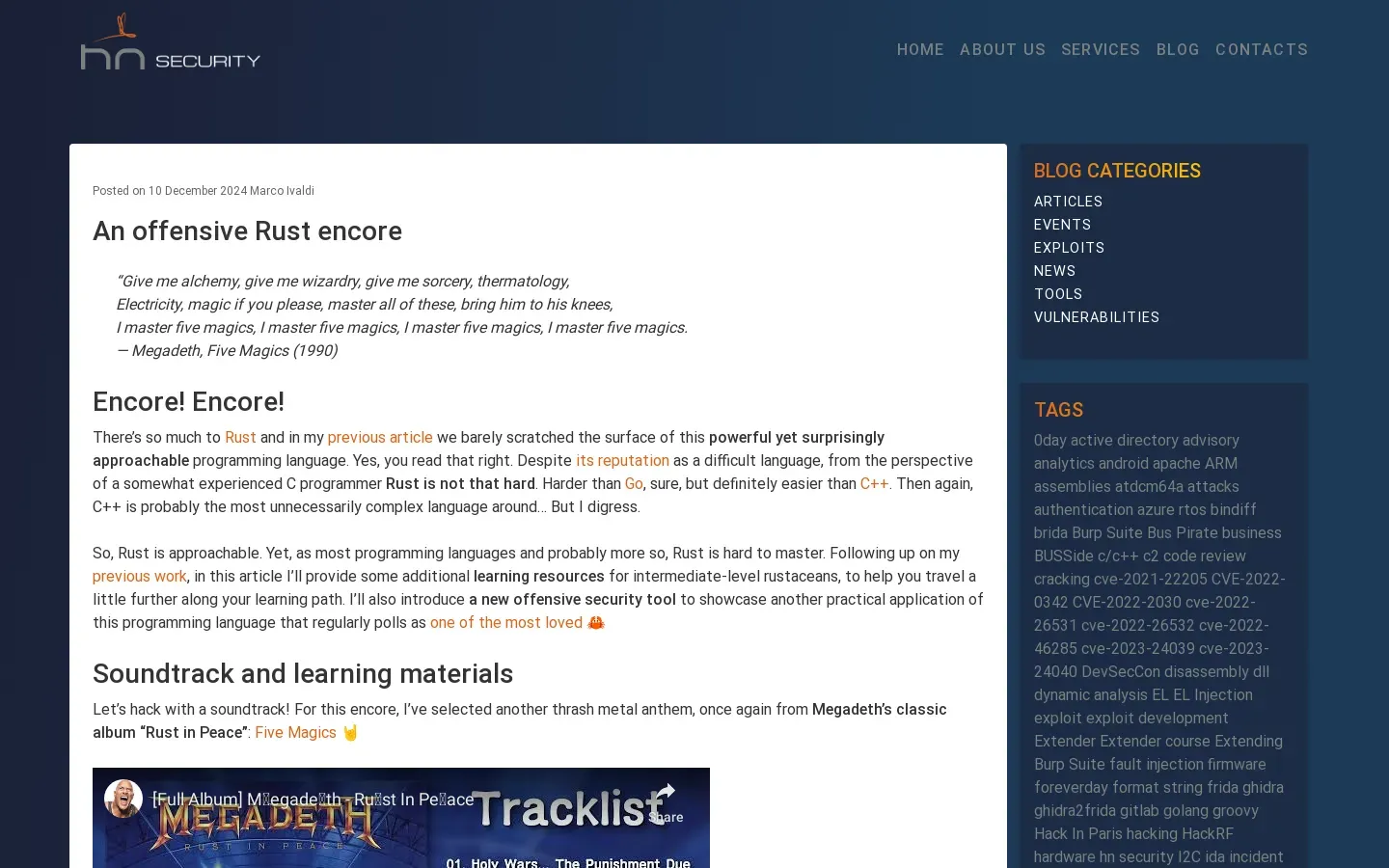
Resources and Practices for Intermediate Rust Developers
/ 4 min read
Quick take - The article discusses the increasing accessibility of Rust programming for intermediate developers, highlighting recommended resources and best practices to enhance their skills, including books on macros, effective coding techniques, and security considerations.
Fast Facts
-
Growing Interest in Rust: Intermediate developers, especially those with C programming backgrounds, are increasingly seeking resources to enhance their Rust skills due to its performance and safety features.
-
Recommended Resources: Key texts include “The Little Book of Rust Macros” for mastering macros, “Rust by Example – macro_rules!” for practical learning, and “Effective Rust” for advanced techniques and best practices.
-
Focus on Software Design: Emphasis on understanding Rust design patterns and API guidelines to create idiomatic, reusable, and user-friendly code.
-
Security Awareness: Developers are advised to evaluate external dependencies carefully and stay informed about potential vulnerabilities to enhance application security.
-
Hands-On Learning: Practical tools and resources, such as the “blindsight” tool, encourage developers to apply their knowledge in real-world scenarios, fostering deeper mastery of Rust.
Enhancing Rust Programming Skills for Intermediate Developers
As the programming landscape evolves, Rust has emerged as a preferred language for developers seeking performance and safety. Its growing popularity is particularly evident among those with a background in C programming, who find Rust’s features both familiar and innovative. This surge in interest underscores the need for resources tailored to intermediate developers eager to deepen their understanding of Rust’s more complex functionalities.
Key Resources for Mastering Rust
For developers aiming to refine their skills, several resources stand out. “The Little Book of Rust Macros” offers an in-depth exploration of macros, a powerful feature in Rust that enables concise and reusable code. This book is invaluable for those looking to master macro creation and usage, providing detailed insights into this advanced aspect of the language.
Another essential resource is “Rust by Example – macro_rules!” This guide serves as a quick reference for developers interested in practical applications of macros without extensive theoretical discussions. By focusing on hands-on learning, it allows programmers to see macros in action across various scenarios.
For those who have already grasped the basics of Rust, “Effective Rust” is highly recommended. It covers best practices and advanced techniques, guiding developers toward writing more idiomatic and effective Rust code. This book addresses common challenges faced by Rust programmers and offers insights that can significantly enhance one’s understanding of the language’s unique features.
Best Practices for Advanced Rust Development
In addition to these resources, several best practices can aid intermediate developers in advancing their skills:
-
Read Effective Rust: This book provides solutions to common struggles encountered by Rust programmers. It is an excellent follow-up after mastering the basics, offering insights into Rust’s unique idioms.
-
Utilize Rust Design Patterns: Familiarize yourself with idiomatic and reusable solutions to common problems in software design. These patterns can lead to more elegant and maintainable code.
-
Follow Rust API Guidelines: Adhering to these guidelines ensures your APIs are user-friendly and consistent, making them easier for other developers to work with.
-
Understand Result/Option Transformations: Grasping the transformations between Result and Option types is crucial for robust error handling. This knowledge helps maintain program stability and manage errors gracefully.
By incorporating these practices into their learning journey, developers can tackle more complex projects with confidence, contributing to the robust and evolving Rust community.
Common Pitfalls and Security Considerations
As developers advance their skills, it’s essential to remain vigilant about potential pitfalls:
-
Ignoring Security Risks of Dependencies: Blindly trusting external dependencies can introduce vulnerabilities. Regular audits of dependencies are crucial, along with utilizing tools that automatically check for vulnerabilities.
-
Neglecting Documentation: Failing to read documentation thoroughly can lead to misunderstandings and improper implementations. Familiarity with best practices provided by documentation is vital for efficient coding.
Security remains a significant theme throughout the learning process. Tools like “Blessed.rs” and “cargo-deny” are recommended for evaluating external dependencies, promoting safer coding practices by highlighting potential vulnerabilities.
Practical Application Through Hands-On Experience
The tutorial also emphasizes hands-on coding experience through tools like “blindsight.” This approach not only showcases Rust’s capabilities but also encourages experimentation with real-world scenarios. By blending theoretical insights with practical application, developers are empowered to cultivate a deeper mastery of Rust and its ecosystem.
In conclusion, leveraging these resources and practices equips intermediate Rust developers with the skills needed to excel in their projects. As more programmers become proficient in Rust, its adoption in systems programming and beyond is likely to grow, leading to enhanced software development practices across the industry.



